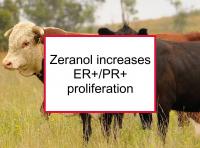Zeranol is an estrogenic compound produced naturally by a common fungus that grows on corn, wheat, oats and some other grains. In fact, zeranol is practically unavoidable as a contaminant of animal feed. The small amount of zeranol and its metabolites consumed indirectly by humans as a result is not considered unsafe.
At some point, it was noticed that zeranol had a positive impact on muscle growth during the finishing phase of beef cattle production. Cattle are expected to gain approximately 450 pounds, on average, during this 120- to 180-day fattening period. Synthetic zeranol was first approved for use as a growth promoter in beef cattle and sheep in the U.S. by the FDA in 1969.
Several studies have demonstrated that zeranol promotes hormone receptor positive (ER+/PR+) breast cancer cell growth and proliferation. Now a new study has reported that low levels of zeranol can increase aromatase expression and estrogen production in non-cancerous breast tissue, suggesting the zeranol can promote breast cancer by increasing breast estrogen levels.
Zeranol and breast cancer
The argument for the safety of zeranol is based on the relatively small amounts of the compound and its metabolites that enter the food chain. The same argument is made for the other hormone compounds approved for subcutaneous (under skin) implants in cattle, among them estradiol, testosterone, and progesterone. However, the blood of mice implanted with zeranol (similar to cattle zeranol implants) was found to increase breast cell proliferation in one study. Another study reported that serum from heifers one month after zeranol implantation stimulated ER+/PR+ breast cancer cell growth. In addition, urinary concentrations of zeranol have been found to be associated with breast cancer risk in women.
The sensitivity of breast cancer cells to zeranol is increased by leptin, a hormone secreted primarily by fat cells—the combination has been shown to increase cancer cell growth and cell division, as well as increasing aromatase expression in breast preadipocytes (a type of undifferentiated cell that can develop into a fat cell). As a result, obese women may be at greater risk of developing zeranol-induced breast cancer.
Latest research finds zeranol increases aromatase activity
The study referenced at the beginning of this news article was designed to investigate whether aromatase expression and activity can be increased by exposure to low-dose zeranol, thereby acting as a source of estrogens that stimulate cell proliferation. Aromatase activity is a process by which androgens are converted to estrogens in the body. To conduct the study, the authors used cultured human breast preadipocytes. The effects of zeranol on cell proliferation, aromatase mRNA expression levels, aromatase enzyme activity and estrogen production were assessed.
Low doses of zeranol (2 to 50 nM) were found to significantly promote cell proliferation, aromatase expression, aromatase activity and estrogen production in preadipocytes. This suggests that zeranol can act as an aromatase activator. The authors conclude that modest levels of zeranol can promote breast cancer growth by stimulating aromatase activation and increasing estrogen production in fat tissue.
